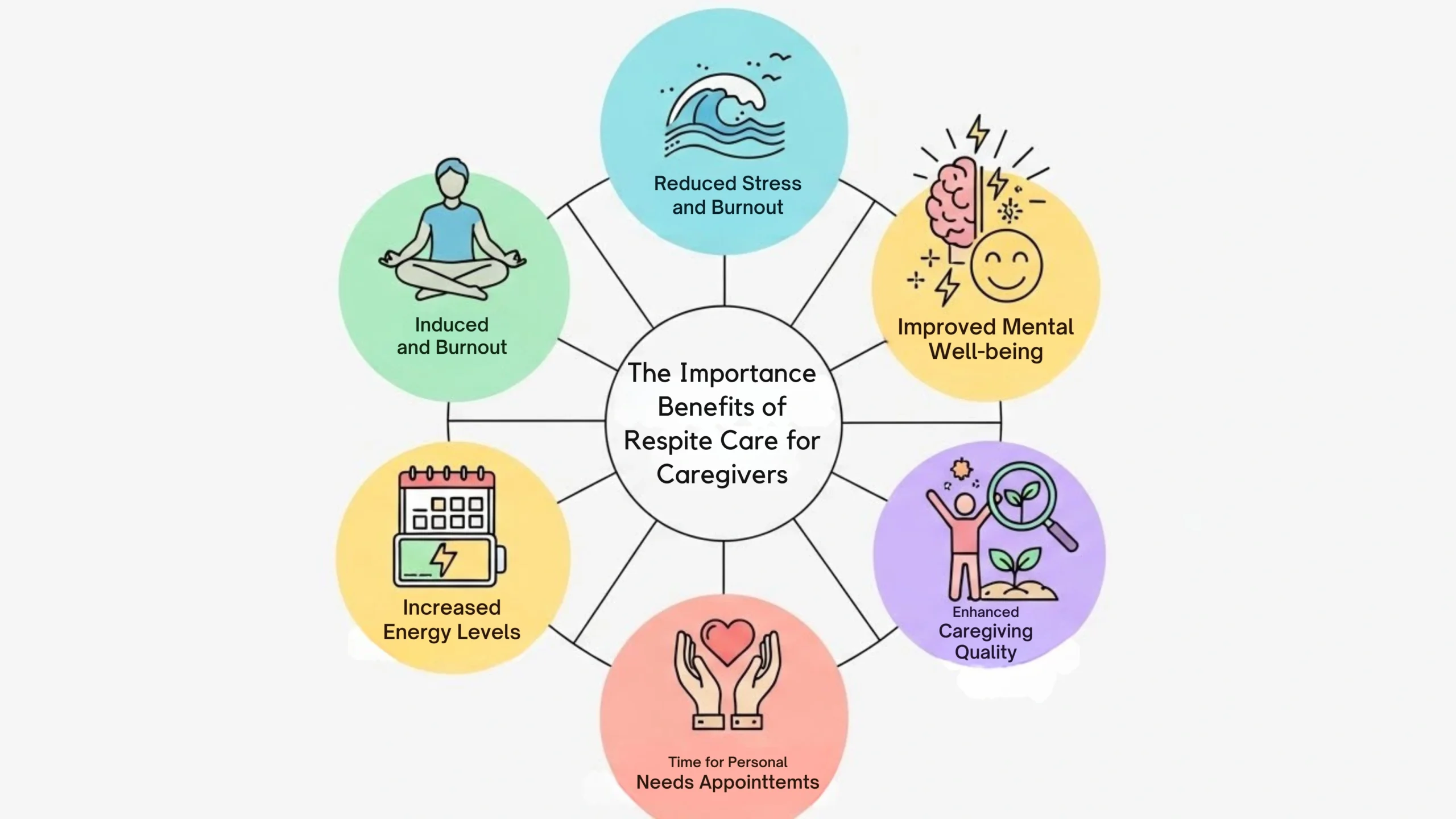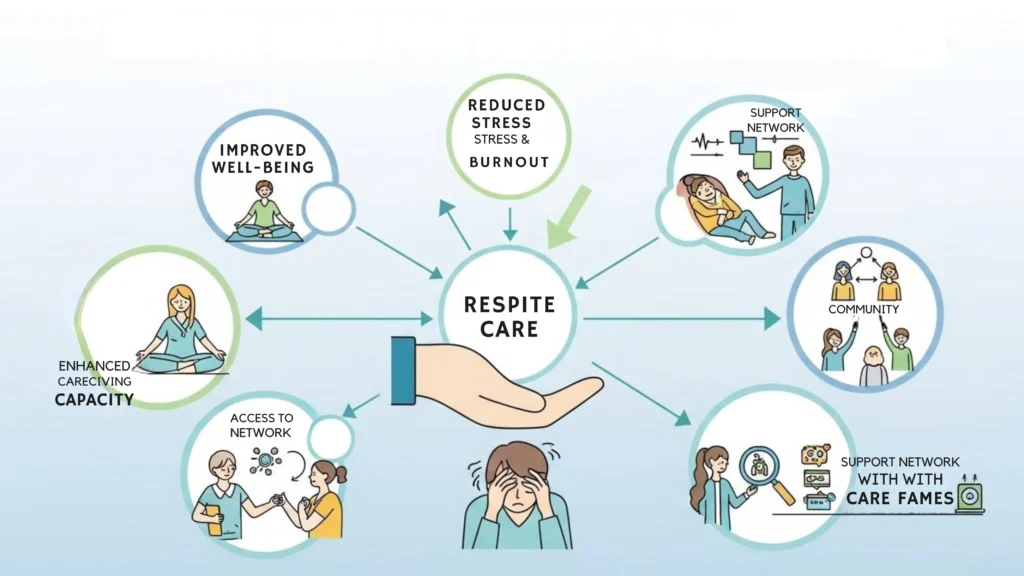
You are up since the dawn, assisting your mom to have a breakfast, medications, and getting dressed. Before noontime, you are answering the calls of the doctor and the laundry. Evenings are lost in the nights of broken sleep due to the chance that she may call you at any time. You love her a lot that is why you do it but there are days when you find yourself peeking out of the window and wondering when was the last time you had a calm cup of coffee or laughed with your friends and did not look at your watch. And this may sound like something you have heard. This is the pull of millions of family caregivers daily.
Respite care changes that. It provides you with an actual rest as a person you can trust comes to take care of your loved one. This is not about taking a step out of your position; rather it is a step back with greater vigor. Here, we will discuss why respite care is so important, what the real positive results of respite care are to you as a caregiver and how respite care positively affects the person you care about as well. We will examine various alternatives, practical means of affording it, and tips of getting rid of that gnawing conscience. By the end, you will understand why taking a break is not a selfish thing to do it is one of the most intelligent things that you can do.
What Exactly Is Respite Care
Respite care is a relief to primary caregivers. It might take one a couple of hours, one day, a weekend, or even weeks. A trained professional, volunteer, or even a family member replaces you during that period, and as such, your loved one receives the care they need allowing you to rejuvenate.
Imagine it to be putting a pause button on a movie long since it has been playing. A person does not give up watching; he or she simply takes a break to stretch his/her legs and have a snack. Respite care is provided either at home, in a day center or at a facility. It is adaptable and based on your needs. Some companies, such as video check-ins in place of in-person companionship, are even doing virtual options since the pandemic.
Why So Many Caregivers Are Burning Out and Why It Matters
Being a caregiver is a satisfying activity, but it is also tiresome. Approximately, 63 million Americans that are out of every four adults are giving care to a loved one without pay in 2025. It is a massive leap since only ten years ago. Others cope with such demanding chores as bathing, feeding, or complex medical care.
The toll shows up clearly. A fifth of the caregivers complain of poor physical health. Approximately, 41 percent report that their general well-being is low. Emotional stress strikes spread too many experience anxiety, depression or simply exhausted. You can get easily irritated and feel guilty about the desire to spend time on your own. That’s burnout creeping in.
Without a break, it gets worse. The health is affected, your relationships are strained and to make matters worse the care you provide may also fail as you are operating on empty. Respite care avoids that spiral. It allows you to relax, and you will be more patient and energetic.
The Real Benefits of Respite Care for You as a Caregiver

Respite care does not just provide you with time off. It enhances your life in physical means.
To start with, it reduces stress and burnout. Research indicates that caregivers who make use of respite complain less of depression and anger and also enjoy an improved mood within a few months.
You have room to take care of yourself as well. Get sleep, access your personal physician, work out or do whatever hobby you had stopped. One of the caregivers that I heard read a book on her porch on a weekend respite visit and felt like herself again.
It improves the bond between you and your significant other. When you are not as frustrated, you appear more attentive and gentle. There is no resentment accumulated.
Lastly, it is healthy in the long-term. Frequent rest periods imply a reduced number of diseases, less chronic stress, and additional years of good care.
How Respite Care Helps Your Love One Too
Respite isn’t just for you. Your loved one gains a lot.
They usually like new faces and new things. In one of the adult day centers, they may play games, craft up, or share with their peers things that stir up the joy and bring the mind to focus.
Experts are represented by professional caregivers. They are able to work through things without problems and even pick out some problems they would not have noticed in the normal day to day activities.
Numerous elderly people or those with dementia flourish on the change. It is a mood booster, since it is monotonous. One of the daughters told me that her father returned home with respite chattier and happier having made a new friend.
Explore the Different Types of Respite Care
Options abound, so you can find what fits your situation.
| Type of Respite Care | Description | Typical Duration | Average Cost Range | Best For | Potential Drawbacks |
|---|---|---|---|---|---|
| Informal (Family/Friends) | Loved ones or neighbors step in for free or low cost. | Hours to days | Free or minimal | Short, familiar breaks | Relies on availability; may feel like a favor |
| In-Home Professional | Trained aide comes to your home for personal care, meals, companionship. | Hours to full days | $25–$40 per hour | Keeping loved one in familiar surroundings | Higher cost; scheduling needed |
| Adult Day Centers | Social daytime programs with activities, meals, health monitoring. | 4–8 hours, weekdays | $50–$150 per day | Social stimulation and routine breaks | Transportation required; not overnight |
| Residential/Facility-Based | Short stays in assisted living or nursing home. | Days to weeks | $150–$400 per day | Longer breaks like vacations or recovery | Adjustment to new place; higher cost |
| Virtual/Tech-Based (Emerging) | Video companionship, monitoring, or activity sessions. | Hours | $10–$30 per session | Light supervision or when in-person is tough | Less hands-on; needs good internet |
This table covers the main choices, including newer virtual options that grew post-pandemic.
Spotting the Signs That You Need a Break
Burnout sneaks up. Watch for these common signs:
| Category | Common Signs | What It Might Mean |
|---|---|---|
| Emotional | Constant irritability, feeling overwhelmed, crying easily, resentment | Emotional exhaustion building up |
| Physical | Chronic fatigue, frequent headaches, getting sick often, sleep troubles | Your body is waving a red flag |
| Behavioral | Withdrawing from friends, neglecting hobbies, forgetting self-care | Isolation and loss of joy |
| Cognitive | Trouble concentrating, forgetting things, feeling hopeless | Mental fog from ongoing stress |
Overcoming the Guilt and Other Hurdles
Conscience stricken most caregivers. You may ask, “But what about the new person, they may not like him or her. or “Nobody does it right like me. It is natural, though you should keep in mind that short breaks will help you become a better care giver in the long-run.
Begin small three or four hours. See the provider prior to the visit. Communicate freely with your loved one. The majority of them adapt and like the change.
Any other obstacles such as the price or locating reliable assistance? Use locators such as ARCH, or get the office of your doctor to recommend. Others have the same concerns and discovered solutions.
What Recent Research Tells Us
Newer studies back up the benefits strongly. One 2025 analysis found respite reduces stress appraisal day-to-day. Another showed bigger gains for women, lower-income families, and those providing most care.
Post-pandemic research highlights virtual respite’s role in keeping connections during isolation. Overall, caregivers using respite regularly report better health, less depression, and longer ability to care at home.
FAQs
How long can respite care last?
It ranges from a couple hours to several weeks, depending on the type and funding.
Will my loved one feel abandoned?
Most don’t many enjoy the change. Introduce it gradually and choose familiar-feeling options.
Is respite care only for seniors?
No, it’s for anyone caring for a person with illness, disability, or age-related needs, including children with special needs.
What if we can’t afford it?
Explore free programs through Area Agencies on Aging, veteran benefits, or non-profits. Many offer sliding scales.
Can I use respite in an emergency?
Yes, many providers offer emergency or crisis options.
Does respite really make a difference?
Absolutely. Caregivers who use it report lower stress, better health, and stronger relationships.




